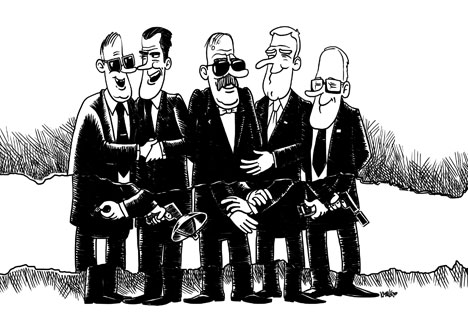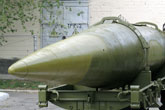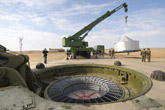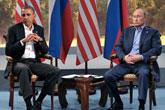Forseeing few benefits in treaty withdrawals

Click to enlarge. Source: Konstantin Maler
Russian President Vladimir Putin recently announced that Moscow may unilaterally withdraw from international treaties, just as the United States has done in the past.
“The United States unilaterally withdrew from the Strategic Offensive Reductions Treaty, and that was that,” Putin said during a meeting with Russian lawmakers. “They claimed that they abrogated this treaty for reasons of their own national security. And we will do exactly the same, when we consider it beneficial and necessary to secure our interests.”
The Russian president was evidently referring to the 2002 decision by the United States to withdraw from the 1972 Anti-Ballistic Missile Treaty.
Certainly countries change their positions, but it is now clear that the withdrawal of the United States from the A.B.M. Treaty in 2002 was a huge mistake. The U.S. made that move when it planned to create an anti-ballistic missile system in Europe, but these plans have never been realized.
Under the A.B.M. Treaty, the United States could deploy up to 100 strategic interceptors. Now, however, the U.S. is planning to deploy only 40 ground-based interceptors by 2020. As for the ship-based Standard Missile 3 (SM-3) system, its technical capabilities to shoot down strategic ballistic missiles are extremely limited – especially after the 2013 cancellation of an advanced modification of the SM-Block 2B.
There are also such examples on the Russian side. In 2007, Russia unilaterally ceased to comply with the Treaty on Conventional Armed Forces in Europe (C.F.E.). Russia has not exceeded any ceilings or quotas in that agreement – on the contrary, Russia has not even achieved 30 to 40 percent of these limits. Yet this purely political gesture resulted in a loss of tight control, through treaty quotas, over all NATO countries in terms of placement and redeployment of troops and heavy weapons in Europe.
Now we can only hope that in the Baltic countries and Poland, Romania and Bulgaria, no new military groups of the alliance appear under the guise of a response to the Ukrainian crisis. They are completely free to do so without this treaty.
Putin had also considered withdrawing Russia from the 1987 Intermediate-Range Nuclear Forces Treaty (I.N.F. Treaty). Discussions on this subject began in 2007 with Putin’s memorable speech at that year’s Munich Security Conference, and they have gained traction in the current political climate.
In his speech, Putin pointed to the creation of medium-range missiles by a series of countries while the treaty prohibited the U.S. and Russia from having a weapons system in this class. Also in 2007, then-Chief of Staff Yuri Baluyevsky explained Russia’s possible withdrawal from the I.N.F. Treaty in response to U.S. plans to deploy missile defense facilities by 2012 in Poland and the Czech Republic. These plans were scrapped, however, under the Obama administration.
Nevertheless, Russia is again discussing the need to develop medium-range missiles and pulling out of the I.N.F. Treaty to counter the threat posed by American cruise missiles. Russian experts have pointed out that Russia’s withdrawal from the treaty is also justified since the U.S. has already violated some technical points of the treaty by creating similar class missiles as “targets” for the testing of missile defense systems.
The discussion of whether or not to withdraw from the treaty is influenced more by the political situation than any strategic analysis, however, since the U.S. missile defense system tests are being held against the backdrop of tensions around Ukraine.
What are the military and political consequences for Russia if it withdraws from the I.N.F. Treaty? With regard to countries that have developed medium-range missiles — a list that includes China, India, Iran, Israel, North Korea, Pakistan and Saudi Arabia — their actions are primarily targeted at each other, or at the United States and its allies. None of them are targeted against Russia.
Additionally, Russia’s nuclear arsenal is between four and five times greater than the number of nuclear weapons held by these other countries combined. Russia also has enough such weapons to deter the United States on a parity basis, which is also enough to deter other countries, either combined or individually, from launching such an attack on Russia. The development of additional medium-range missiles is not needed for this.
However, Russia’s withdrawal from the I.N.F. Treaty could further damage relations with the United States and its allies in Europe, which would then have a real reason to be worried about Russian medium-range ballistic and cruise missiles. Such a move could lead to the expansion of the European Missile Defense System, which would become a subject of even greater concern for Moscow. Moreover, NATO countries are able to respond not only with defensive but also offensive systems.
Withdrawing from the I.N.F. Treaty would enable Russia to deploy medium-range missiles, but this would not affect the strategic balance with Washington. Russia has intercontinental ballistic missiles for this purpose and if Russia developed the kind of weapons banned in the agreements reached in 1987, the only part of the U.S. they could reach if launched from Russian territory is Alaska.
Moreover, if Moscow withdrew from the treaty, Washington would have the right to deploy new offensive medium-range missiles on the territory of its allies in Europe, making it possible for American weapons to strike deep inside Russia, thanks to NATO’s enlargement eastward. An American mid-range weapon launched from Poland or the Czech Republic would require only a short flight time to reach beyond the Urals.
As a result, a serious strategic imbalance would appear, not to mention the beginning of an entirely new, and what recently seemed forgotten, phase of confrontation with the West.
Alexei Arbatov is the head of the Center for International Security at the Institute for World Economy and International Relations (IMEMO) at the Russian Academy of Sciences.
Read more: Should Russia fear the U.S. 'Prompt GlobalStrike'?
All rights reserved by Rossiyskaya Gazeta.
Subscribe
to our newsletter!
Get the week's best stories straight to your inbox



